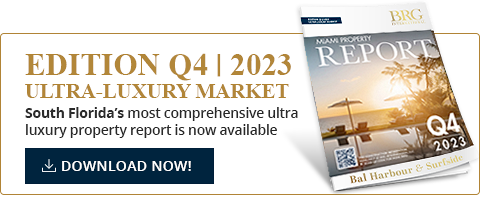An Argentine Family Made Changes for Years to Come
June 15, 2018What started off as an everyday business trip, developed into so much more as Jose Luis Ferreira de Melo and his sons, Carlos and Martin saw so much unused potential in a downtown neighborhood in Miami. Ferreira is the president, and his sons are the two principals of the Melo Group which is a real estate development company from Argentina.
They quickly began purchasing land, their first being a one-acre lot at 615 NE 22nd St in Edgewater for the price of $1.9 million. “Edgewater had been depressed for so long that local developers had given up on it,” explained Martin. “People had been waiting for the area to take off and it never did. But for someone like us coming from the outside looking in, you could only see the potential and the future, not the past. You’re not as scared to take a chance — probably out of sheer ignorance.”
The Melo Group spent the next 17 years growing and developing their stake through South Florida. Their strategies? Expanding into neighborhoods before they were popular, targeting foreign buyers when the U.S. economy couldn’t support development, and include diversity in their developments by balancing luxury towers and market price apartments and rentals.
They must be doing something right. Melo opened the doors to Aria on the Bay, which is a 53 story luxury condo. It contains 648 separate units that range in price from $400,000 to over $12 million. The units are already 90% sold.
Aria on the Bay isn’t the only recent development. There is also the Square station, which is set to open this month. And a new apartment development under construction, Art Plaza, will open this coming year. At the completion and opening of these projects, the Melo Group will have developed and put 4,896 units on the market since 2003.
“These guys have stayed ahead of the curve and developed subprime markets that are located a block or two from where everyone else is looking,” said Peter Mekras, managing director of Aztec Group, an investment and merchant banking firm, Aztec has assisted the Melo Group with land acquisitions in the past. “They fit into a unique category of developers who are building for their own account, not an institutional partner. They do condo projects such as Aria only when the appropriate parcel of land presents itself. They buy land to build on it, not to speculate.”
A family tradition
Compared to other companies, the Melo Group is still considered a small family business. But to them, that is a strength.
“They’re vertically integrated, and they’re very hands-on,” said Alicia Cervera, the Realtor in charge of sales at Aria on the Bay. “These are not people sitting in an ivory tower. The three of them, the father and the two sons, go to work every day. They’re actively involved in their business. They can walk through a job site and know what everyone there is doing. They make you feel like a critical part of their team. They are very task-oriented, and they don’t waste time, but they recognize and appreciate good work. And they also hold you accountable.”
The Melo Group was founded in 1948 by Jose Luis’ father in 1948. Before their development in Miami, the Melo Group had over 5,000 condos developed in Argentina. When Argentina hit a hard financial crisis, the Melo Group saw it as an opportunity rather than an end. And in this case, that opportunity was called Edgewater.
“Edgewater is next to the water, near I-95 and Brickell and downtown,” said Carlos, who oversees the design and architectural elements of the company’s projects. “You have two causeways that connected to the beaches. There was already talk of an arts center. The location was great. There were a lot of homeless people and drug addicts in the area. But my dad always says, ‘People can always be relocated, but places cannot because they are fixed. If a location is good, it will always be good.”
Melos wasn’t only enticed by the land, but also because Miami was, “very welcoming to foreigners,” said Martin, “After two years, you are considered a local. Spanish is spoken here. The U.S. has been using the same currency for 200 years. There is physical, economic, judiciary and legal security here. And the crisis in Argentina was so bad we didn’t know if there were going to be guerrillas.”
Against the grain
In 2010 the Melo Group made a wave in traditional financing. They stood out because most companies were sitting on unsold inventory while Melo was diving into developing. Their way of funding became popular quickly, and developers started requiring buyers to put down 50% as a down payment – all cash. This was a new practice in the U.S.
“During that time, an apartment in Bogotá or Sao Paulo cost as much as one in Miami,” Carlos said. “They were even more expensive because those cities were economically strong and Miami was depressed. Buyers had a lot of extra money to spare, so it was no problem to ask them for a 50 percent down.”
“We were able to make a product that cost the same as a foreclosed or short-sale building,” Martin said. “There were buyers outside of Miami who wanted to take advantage of the depressed market but didn’t want to buy property that was foreclosed. They wanted brand new, clean condos at a lower price.”
“In a way, we were the beginning of reactivation of Miami,” said Jose Luis. “The local economy was stimulated by the foreign capital that came here. People who complain that condos are too expensive, but thanks to those expensive units, a lot of people — auto mechanics, hospitality staff, restaurant workers — have jobs. And all those foreign buyers pay local taxes, too. If we’ve had a competitive advantage over our competitors, it’s not because we’re lucky. It’s because we’ve worked hard.”

